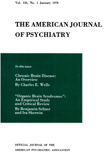THE TREATMENT OF DRUG ADDICTION: PRIVATE PRACTICE EXPERIENCE WITH 84 ADDICTS
Abstract
The scope of this report covers 30 years of private practice experience by two psychiatrists who treated 84 drug addicts, emphasizing the diagnostic features, correlating therapeutic principles, the prognosis and the results of therapy. Each patient was treated for the problem of drug addiction, and therapy was not directed toward the particular addicting agent. The same psychotherapeutic principles apply for addiction to narcotics, sedatives, tranquilizers or stimulants. Special emphasis was placed on the addictogenic feature of a disturbed human interrelationship as a significant etiologic factor. Fewer sociopathic personality disturbances and better motivated patients constituted our private practice experience. There is a definite relationship between the diagnosis and the prognosis. The results set aside the generally accepted very bad prognosis for addiction problems. This report is designed to fill the present gap of reports regarding treatment methods and results of therapy for drug addiction. We believe that the following of our basic therapeutic principles will materially increase the competence of the psychiatrist to handle his addicted patients.
Access content
To read the fulltext, please use one of the options below to sign in or purchase access.- Personal login
- Institutional Login
- Sign in via OpenAthens
- Register for access
-
Please login/register if you wish to pair your device and check access availability.
Not a subscriber?
PsychiatryOnline subscription options offer access to the DSM-5 library, books, journals, CME, and patient resources. This all-in-one virtual library provides psychiatrists and mental health professionals with key resources for diagnosis, treatment, research, and professional development.
Need more help? PsychiatryOnline Customer Service may be reached by emailing [email protected] or by calling 800-368-5777 (in the U.S.) or 703-907-7322 (outside the U.S.).



